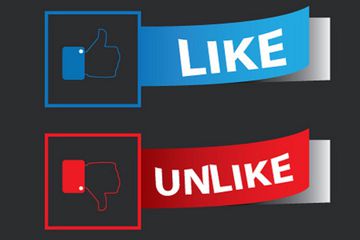Why Do We Love Those 'Likes' On Social Media?
Social media seems to have become today's equivalent to our generation’s ‘log kya kahenge’. While we may maintain that we don’t care what our parents and family think of us, it is imperative to us that our friends on these networking sites believe we live a fun and fulfilled life.
Take Pearl for example, dressed to the nines, she did not spare any effort for her best friend’s wedding. Hair, makeup, clothes, jewellery--all thought out and beautifully matched. Before leaving for the venue, Pearl took a few pictures to post on her social network with the hashtag #bestfriendswedding. She believed she looked fabulous, and expected to receive compliments.
But an hour later, she had received only a handful of ‘likes’. Pearl spent the rest of the evening constantly checking her phone for more likes and comments, and was miserable that they did not hit the desired number for the effort made. The result: Pearl did not enjoy her friend’s wedding and was left with feelings of low self-esteem.
The barrage of social networking sites is great to reconnect with old friends or learn and share interesting ideas, but they place a heavy demand on a person’s sense of self-worth. What used to be a rush to share secrets with friends is now a need to publicise every aspect of our lives digitally.
The number of friends you have on Facebook (or followers on Instagram and Twitter) is the new cool quotient, and the pressure to look good on these sites is tremendous. Kids as young as 11 and 12 have phones full of photo-editing apps, and how our lives are perceived online is more important than the ones we actually live in!
‘Online networking’ has become a fixation with the young and the old alike; however, the young are pulled into its lure a lot more easily. Research shows that this obsession we have with the digital world is very damaging to the psyche of the young adult. Many develop narcissistic personalities and anti-social behaviour, preferring their followers in the virtual world--some of whom they barely know--to friends and family. Studies have also shown that sites like Facebook can make people prone to depression, anxiety and other such psychological illnesses. Another independent study shows a direct link between increasing online activity and declining grades.
We also believe that sharing pictures,etc on social media is safe, and that the content is limited to our own circles, but it is simply not true. Everything we put on the Net is available to many more people than we intended to share it with. The internet is not a safe place and sharing on social media is dangerous, no matter how many safety filters you apply. Many sites do not remove content from their servers even after you hit the delete button. While it won’t show on your page, it is still stored with them.
There have been many cases of bullying on social media. While earlier a child could return to the safety of his/her home, now there is no getting away. The bullies enter the home via social networks without being physically present. It is no longer a one-to-one; there is public humiliation and maligning for all to see, and there have been multiple reports of suicides to escape this virtual torture.
Not only is social media addictive; it gives us an open window to pry into people’s lives and compare ours with theirs. Many suffer from low self-esteem if they perceive their life as less interesting; or they develop an elevated sense of self due to validation from online peers. Some go to great lengths to maintain that endorsement.
Like Pearl, Sanjay too sought extensive approval on a photo sharing app. To increase his followers and gain popularity, he would perform dangerous stunts without supervision and post pictures online. The more popular he got, the more dangerous the stunts became. In a freak accident, while trying to capture a treacherous moment, Sanjay lost his balance and subsequently both his legs. His online admiration cost him a lifetime in a wheelchair.
Are social media just evil lurking behind us; is there no escape for us? Though psychological disorders due to social media are on the rise, one thing is for certain: this fascination is here for the long haul. While there are both positives and negatives to the networking that has taken the world by storm, learning how to use this amazing service prudently could be our best defence against it.
(Image sources: pixsbay.com; webbyarts.com)
















